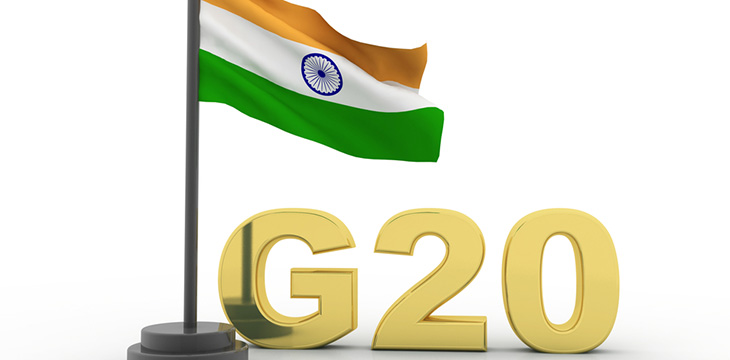|
Getting your Trinity Audio player ready...
|
India is doubling its efforts at achieving a global digital asset framework through its G20 presidency as the industry continues to deal from the shocks of several collapses.
The country’s Finance Minister, Nirmala Sitharaman, reiterated the government’s position at a discussion at the Peterson Institute for International Economics, where she confirmed that developments are at advanced stages. India announced its interest in spearheading a concerted digital asset regulatory framework for G20 nations when it assumed the role of president in November 2022.
“Cryptocurrencies are a very important part of the discussion under the G20 India presidency, given so many collapses and shocks in cryptocurrencies. We seek to develop a common framework for all countries to deal with this matter,” Sitharaman said.
Sitharaman noted that it would be impossible for countries to individually craft regulations for digital currencies in their jurisdiction because digital currencies are inherently borderless. By having a global outlook on them, the minister remarked that bad actors would not be able to profit from regulatory arbitrage and providing a blueprint will assist member countries in policing the sector.
At the first G20 Finance Ministers and Central Bank Governors (FMCBG) meeting in February, attendees agreed on ideas for draft regulation. The International Monetary Fund (IMF) and the Bank for International Settlements (BIS) revealed that they would be working on a joint report to support the G20’s push for a common framework to mitigate digital currency risks.
Sitharaman also disclosed that India would be keen on using its presidency to address the debt distress faced by low-income nations like Sri Lanka and Ghana. The FMCBG, World Bank, and the IMF have been holding roundtable discussions to tackle challenges and prevent contagion to middle-income countries.
“In G20, there is an opportunity for India to bring all countries together to address debt distress in middle-income and low-income countries. Multilateral institutions are coming up with resolutions for debt-laden countries in 3 to 5 years’ time,” Sitharaman stated.
Rough patch ahead for digital currencies
With India steering the push for global digital currency regulation, experts have pointed out that the ecosystem could face a difficult patch in the coming months, given India’s tough stance on the asset class.
India has not imposed any bans on digital assets, but the country’s tax policy has been described as some of the toughest in the world. Investors in the space are expected to pay 30% tax on gains and an additional 1% tax deductible at source (TDS), with the government remaining resolute on its decision.
Despite the tough stance on digital currencies, the government appears to have viewed blockchain technology favorably, saying that it is targeting nearly 50% adoption. Blockchain has since been deployed in several government processes like the land registry and forensics by New Delhi’s Forensic Science Laboratory (FSL).
India will be the biggest blockchain nation in 5 years: IPv6 Forum’s Latif Ladid
Recommended for you
British lawmakers of the parliamentary national security committee have called for a temporary ban on political parties receiving donations in
Circle (NASDAQ: CRCL) soared in 2025 thanks to U.S. ‘regulatory clarity,’ but can this momentum survive a ban on crypto

 02-27-2026
02-27-2026 




